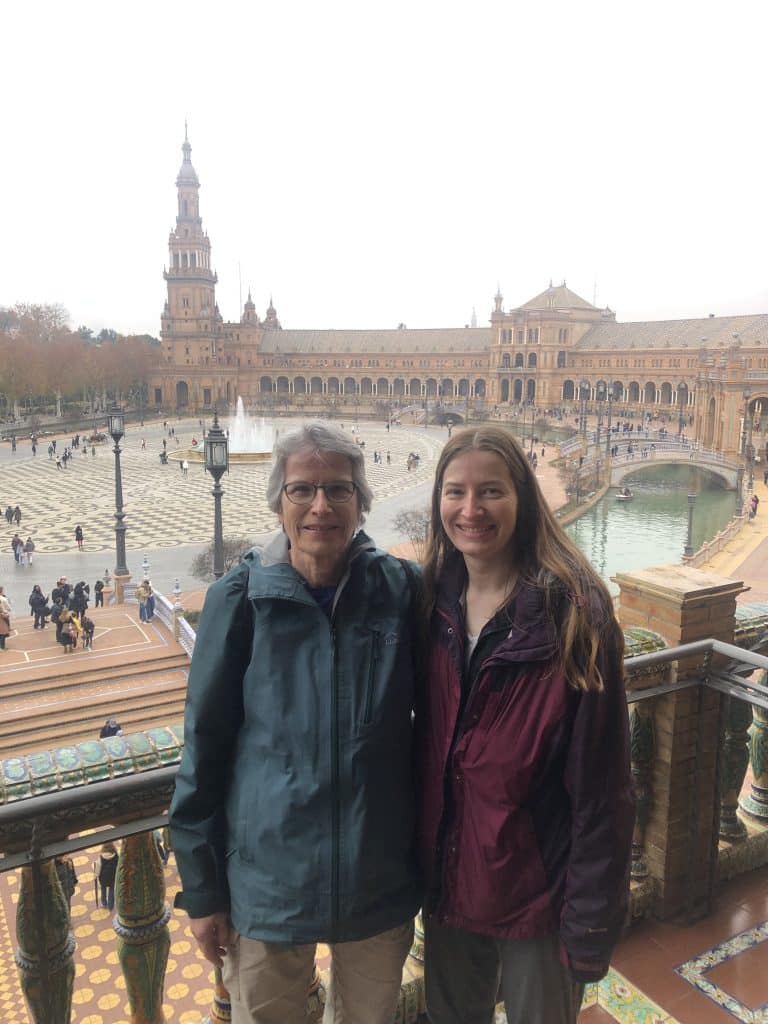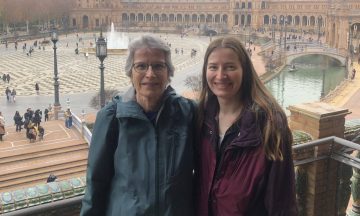This is the second in a series of guest posts on the topic of mixed faith marriages (MFM) from a variety of mental health professionals, coaches, podcasters, counselors and regular readers offering advice from their own experiences. Keep your eyes on the blog over the next few weeks for more great content, and feel free to submit your own essay to this series by emailing [email protected]. (Thanks! -Abby Maxwell Hansen)
Guest Post: Terry is a retired hydrogeologist for the state of Wisconsin. She volunteers with her neighborhood association and enjoys helping connect people with local support services. She lives with her husband in Madison, WI. (She is shown vacationing with her daughter Cara in the image above.)
“Does the church consider it a sin for us to marry?”, my fiancé, Marty, asked my Bishop. We were meeting, at my behest, to discuss our impending marriage. “Yes, a sin of omission”, he replied. I don’t remember the rest of that interview, only that I left upset and unhappy. Marty, a “non-member” and I had met about eight months before at a birthday party where the host had arranged our blind date. I knew when I set eyes upon him that he was special and that we’d get to know each other better. Now, approaching our wedding, I thought it would be good to get some marriage insight and advice from my ecclesiastical leader.
I’d joined the church seven years before in 1973, at 19, and was an “all in Mormon”. I felt I’d found my people. I felt embraced and accepted. As a first born, an extrovert and kinetic learner, the expectations of always accepting callings, following leaders, keeping the rules (written and unwritten), and actively engaging with members, appealed to my personality. In a very real way the Mormon church was my life – it was easy for me to be a box checking, rule-following Mormon. I ate up the idea that while I couldn’t actually achieve perfection in this life, I could be perfect in specific ways (a common topic of Sacrament talks in the 1970s). Monthly visits to my assigned sisters? Check. Leader of the ward YSA group? I drove hundreds of miles monthly collecting the YSAs who didn’t have cars so they could attend our weekly meetings. When we started dating, Marty attended those YSA activities, too. He was welcomed and befriended.
Marty is a life-long member of the Church of Christ Scientist (aka Christian Science). LDS and Christian Science practices are similar in important ways – local churches function as members voluntarily fill and alternate in leadership, teaching, and other roles. Both have a very similar health code that members by and large abide by. Therefore, the outward practice of each other’s religion were very familiar to us both. The doctrinal teachings, however, are quite different. One example: where Latter-day Saints believe that matter is eternal and even spirit is refined matter, Christian Scientists eschew matter and believe that everything is spiritual. This forms the basis of their approach to healing physical ailments through prayer and faith rather than by seeking medical help.
After a few months, when it was clear that our friendship might lead to marriage, Marty and I spent many, many hours discussing our religious views, our commitment to our religion, and the things that attracted us to our church communities. We exchanged holy books – Science and Health with Key to the Scriptures by Mary Baker Eddy and the Book of Mormon — and attended one another’s worship services (easy because our chapels were only a few blocks apart). When we got engaged, we agreed to core principles that have guided the last 44 years of our lives: 1) we would respect each others beliefs and commitments; 2) we would not try to convert the other to our religion; and 3) any children we had would be raised LDS. The last point was non-negotiable for me. Marty had visited Primary and admired the strong youth program in LDS church and didn’t have a concern with this stipulation.
The evening of our interview with the Bishop was my first clue that my experience and perception of the church would change when I married. While my friends in the ward were happy and supportive of my decision, there were others who were less enamored. Some ward members urged me to “convert” Marty before we married and others warned me that the Lord expected me to be married in the temple. It was the first time I’d experienced a direct push back and judgement from ward members for a decision that I felt in my heart was right and good.
We were married in early 1980. At that time, my marriage meant I’d never have access to the temple. Non-endowed women who married non-members were barred from temple attendance until about 1984. (The reverse was not true for LDS men.) Thus my marriage was an awakening to the inequities that had always existed in the church but I was unwilling to see. I have continued to faithfully serve in the church and spent many years in ward and stake leadership callings. With those callings, other scales have fallen from my eyes — the unequal power dynamics in church councils, the wounds of historical racism, the privilege of being a white American in the most American of all churches. My “mixed faith” marriage has been my entree into more complex, nuanced understanding of myself, of the church, and of the world around me.
I have been deeply blessed by my husband and our marriage. I believe our marriage is as or more successful than many temple marriages I’ve observed. An important dynamic in our marriage is that we are “equally yoked”. There is no priesthood power dynamic in our household, no sense that one or the other of us is expected to or needs to “preside”. We support each other fully in our respective church callings. We’ve done a lot of service across our congregational boundaries. Marty, an Eagle Scout, spent more than 30 years supporting our ward Scouting program and as chair of the ward Scout committee. I’ve done childcare at his church lectures, shoveled snow and raked leaves at his church. We have good friends from both congregations. Our life is enriched by our respective church communities.
Over the years I’ve come to realize that I’m lucky to not carry the expectational freight of a temple marriage. I’ve been free to choose how I interact with the church, what doctrines I choose to believe or not believe, how “in” or “out” of sync I feel with the latest church policies, without those gyrations and concerns rocking the boat of my marriage. I can complain to Marty about the LDS church without those concerns having anything to do with our relationship. Marriage is hard enough without feeling that one’s eternal salvation is dependent on the choices one’s spouse makes. I’m willing to accept the consequences of my own choices. I do not worry about my or my family’s eternal existence in the Celestial Kingdom. I am convinced that God, in Their infinite love and wisdom, has prepared mansions for all their children.

___________________
This post is part of a series about navigating Mixed Faith Marriages. Find more from this series here.






6 Responses
“Expectational freight of a temple marriage…” is an accurate description.
Ah. I love this. Thank you for sharing.
Beautiful. Thank you for sharing.
I actually envy the ability you had with your spouse to compare what each of you believed. I think that is very important to help a couple respect each other, understand each other, and make any marriage work.
Even though I met my husband at church, we never had that. He had a concept of God which is about the same as President Nelson, with obedience being the first law of Heaven. And although I considered myself Mormon, my concept of God was one of unconditional love, with love as the first law of Heaven. This difference is quite simple, yet it makes a profound difference in how one interacts with the church and with other people. We argued, with him thinking I was 3/4 apostate, even though I could name many general authorities who agreed with me. We just couldn’t talk about religion because he expected that two “good Mormons” would 100% agree, and I just couldn’t accept a God who looked down on women, and only loved those few sons who were like Abraham, willing to kill their child out of obedience. No, to me Abraham failed when he was willing to obey evil and not put love over obedience. I knew I couldn’t do it and knew that God was just fine with that.
So, we couldn’t respect each other’s Mormonism. Only thing we ever argued about. We were a mixed faith marriage in the same church.
It wasn’t until I decided that I just couldn’t keep believing in Mormonism that we came to a place where we could fully accept that we were a mixed faith marriage and learn to make the best of it.
I remember receiving similar judgmental comments for my decision to marry a non-member. I’m thrilled that you were able to brush those off and have a long and happy marriage. You’re totally right that a mixed-faith marriage can be as good or better than a lot of Temple marriages.
Terry was the Relief Society President when I was the Bishop of our ward. I called her my Co-Bishop, and it was a joy to work with her as a true equal. Her essay shows only a small window into how amazing she is. She has taught and continues to teach me by her example of lovingkindness and ministering in a pragmatic and compassionate way. Her husband is equally wonderful. Thanks for providing this wonderful woman a platform to share her lived experience.